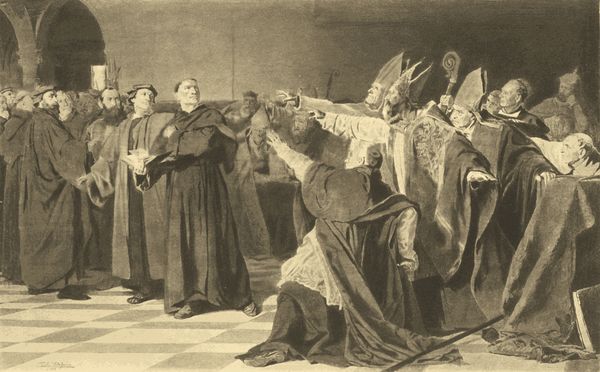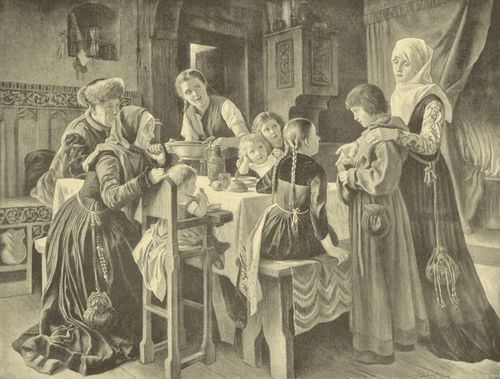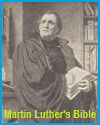 Martin Luther, born on November 10, 1483, in Eisleben, Germany, was a seminal figure in the Protestant Reformation and one of the most influential individuals in Western history. His theological writings and actions fundamentally transformed Christianity and had profound political, social, and cultural impacts.
Martin Luther, born on November 10, 1483, in Eisleben, Germany, was a seminal figure in the Protestant Reformation and one of the most influential individuals in Western history. His theological writings and actions fundamentally transformed Christianity and had profound political, social, and cultural impacts.
Luther initially pursued a career in law but shifted to theology after a life-changing experience during a thunderstorm, leading him to become an Augustinian monk. He was ordained as a priest in 1507 and later earned a doctorate in theology. As a professor at the University of Wittenberg, Luther became increasingly disillusioned with certain practices of the Catholic Church, particularly the sale of indulgences, which were believed to reduce punishment for sins.
On October 31, 1517, Luther famously nailed his Ninety-Five Theses to the door of the Wittenberg Castle Church. These theses criticized the church's practices and called for a return to a more authentic, scripture-based Christianity. This act is often considered the starting point of the Protestant Reformation. Luther's ideas rapidly spread across Europe, fueled by the recent invention of the printing press, which allowed for the wide dissemination of his writings.
 Luther's teachings emphasized salvation by faith alone, the authority of scripture over church traditions, and the priesthood of all believers. He translated the Bible into German, making it accessible to ordinary people and thus encouraging personal interpretation of the scriptures. This translation had a lasting impact on both religion and the German language.
Luther's teachings emphasized salvation by faith alone, the authority of scripture over church traditions, and the priesthood of all believers. He translated the Bible into German, making it accessible to ordinary people and thus encouraging personal interpretation of the scriptures. This translation had a lasting impact on both religion and the German language.
Despite his significant influence, Luther faced severe opposition. In 1521, he was excommunicated by Pope Leo X and declared an outlaw by the Holy Roman Emperor Charles V at the Diet of Worms. Protected by sympathetic German princes, Luther continued to write and preach, shaping the course of the Reformation.
 Luther's later years were marked by continued theological work, the establishment of Lutheran churches, and increasingly polemical writings against various groups, including Jews and other Protestant reformers. He died on February 18, 1546, in Eisleben, the same town where he was born.
Luther's later years were marked by continued theological work, the establishment of Lutheran churches, and increasingly polemical writings against various groups, including Jews and other Protestant reformers. He died on February 18, 1546, in Eisleben, the same town where he was born.
Martin Luther's legacy is immense. His challenge to the Catholic Church's authority not only led to the formation of Protestant denominations but also contributed to the broader movement toward religious freedom and individual conscience. His work laid the foundations for modern Western Christianity and influenced various aspects of Western thought, politics, and culture.
|
 Martin Luther, born on November 10, 1483, in Eisleben, Germany, was a seminal figure in the Protestant Reformation and one of the most influential individuals in Western history. His theological writings and actions fundamentally transformed Christianity and had profound political, social, and cultural impacts.
Martin Luther, born on November 10, 1483, in Eisleben, Germany, was a seminal figure in the Protestant Reformation and one of the most influential individuals in Western history. His theological writings and actions fundamentally transformed Christianity and had profound political, social, and cultural impacts.  Luther's teachings emphasized salvation by faith alone, the authority of scripture over church traditions, and the priesthood of all believers. He translated the Bible into German, making it accessible to ordinary people and thus encouraging personal interpretation of the scriptures. This translation had a lasting impact on both religion and the German language.
Luther's teachings emphasized salvation by faith alone, the authority of scripture over church traditions, and the priesthood of all believers. He translated the Bible into German, making it accessible to ordinary people and thus encouraging personal interpretation of the scriptures. This translation had a lasting impact on both religion and the German language.
 Luther's later years were marked by continued theological work, the establishment of Lutheran churches, and increasingly polemical writings against various groups, including Jews and other Protestant reformers. He died on February 18, 1546, in Eisleben, the same town where he was born.
Luther's later years were marked by continued theological work, the establishment of Lutheran churches, and increasingly polemical writings against various groups, including Jews and other Protestant reformers. He died on February 18, 1546, in Eisleben, the same town where he was born.







